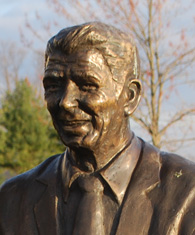 |
 |
|---|
Two Movie Masterpieces Starring Ronald Reagan
(Feb 17, 2014)
If you remember Ronald Reagan's ascendancy to and incumbency in The White House, you may also recall that depictions of his acting career usually confined his achievements to playing "The Gipper" and sharing top billing with a chimpanzee.
Mentions of Kings Row, when they were rarely uttered, were quickly chased by Reagan's memorable line in that film. When repeated out of context, "Randy! Where's the rest of me?!" sounds like something issued by a hungover frat boy whose legs are numb when he comes to.
In fact, the legs of Drake McHugh, Reagan's character in Kings Row, had been unnecessarily amputated by an evil doctor, a doctor who kills and maims.
In the 1940s, the decade of Henry Bellamann's novel and the movie, such a perverted physician would have been the worst of villiains, even if he killed for high purposes. Doctors who kill for high purposes are now common. We are in days when they legally destroy infants and lately in Belgium, can euthanize teenagers.
I have to reread Kings Row for I suspect that this tale set in a Missouri town (Bellamann was a music teacher from Fulton, Mo.) is about a world that has become Godless, mad and cruel in the time between the Reformation and Friedrich Nietzche. As Hawthorne's Boston in The Scarlet Letter has its jail and cemetery, so Kings Row has a college and an insane asylum. The book casts a Catholic priest who is not scripted in the movie. The mysterious loner and pioneer in Psychiatry, Dr. Alexander Tower laments to his student and main protagonist, Parris Mitchell that "Man's [psychological] discomfort began not long [after the Thirteenth Century]...when Galileo and a lot of other fellows with brains in their heads came along and spoiled all that."
In Bellamann's bleak anti-Our Town work, even Dr. Tower becomes a votary of the Dionysian propounded by Nietzche.
Kings Row's tale of downward mobility played several chords with me when I first read it in the 1990s. Like Drake McHugh, I was raised on one of the nicest streets in town but had to mortgage and then sell my family home. Like Drake, I had to put up with people who did not think I was good enough for their daughters or sisters. I was sick of suburbanites who worried about how things look and of insane or incompetent people who get ahead by chutzpah rather than by true ability. Come to think of it, I still am. The great thing about reading or creating literature is that you can join a community of others who understand. Henry Bellamann understood.
In the movie the sexual stuff of the book was only vaguely hinted at to get the film by the censors, The storylines are pared down to those of Parris Mitchell (Robert Cummings), Cassie Tower (Betty Field), Drake McHugh (Reagan) and Randy Monaghan (Ann Sheridan). Raised by his grandmother (Maria Ouspenskaya) on a prosperous plant nursery circa 1900, Parris is Cassie Tower's only friend. He is prepped for medical school in Vienna by Cassie's father, Alexander (Claude Rains), a doctor who keeps to himself and who in any event, is not considered to be uptown stuff by the local brahmins. The tragedy of The Towers inspires Parris to study the new field of Psychiatry when he gets to the Austrian capital.
Parris' best friend Drake McHugh hopes to marry Louise Gordon but his running around with other women earns him the wrath of Louise's parents. Her father is Dr. Gordon who performs operations without anesthetic and who has racked up a noticeable body count. Drake then reunites with childhood friend Randy Monaghan, a toughey red-haired daughter of a railroad worker from the other side of the tracks. Drake and Randy plan their future until Drake's trust fund is stolen by the banker (one of Kings Row's solid citizens). Randy's father gets the now penniless Drake a job on the railroad where he is injured in an accident. Dr. Gordon "treats" Drake, amputating his legs and presumably more. Reagan's performance made him a star.
A great movie can be one in which we are able to see characters experiencing situations familiar to us and how those characters are able to resolve them. Parris has the choice of going to the unpopular Cassie's birthday party, to which he was invited first, or to popular Louise Gordon's party which was scheduled to draw guests away from Cassie's. Later Parris has to decide whether or not to commit the sane Louise to the asylum to protect Drake.
Peacemaking, Pity and Perseverance
Another film about a situation that we have all experienced is The Hasty Heart, made in 1949. Reagan plays Yank, an American soldier recovering in a military hospital in Burma just after World War II. His wardmates include a New Zealander, an Aussie, a Brit and an African subject nicknamed for the only English word he knows, "Blossom."
All are waiting to be released so they can return to their homes. They are asked by their nurse, "Sister" [as Brit nurses were called] Margaret Parker, played by Patricia Neal, to befriend a young soldier from Scotland. The Scot does not know that because of a failing kidney, he will not live long and never return home.
Even though nobody could refuse Patricia Neal if she asked them for anything, the five men, out of a pure decency that you just do not see in movies of recent decades, welcome the stranger. Yank, of Scottish descent, who happens to dislike Scots is apprehensive, but even he goes along.
These men know how to welcome the stranger, but the stranger, true to Yank's apprehension, proves to be very resistant to being welcomed. Lachlen MacLachlen, "Lachie" as the men nickname him to his resentment, doesn't want to talk unless to chew out his wardmates for receiving letters from home which are a waste of paper and transport. Even though he boasts of having many friends, Lachie receives no letters. He will owe no one anything and resents the slightest favor. Worst of all, he plays his prized bagpipes.
Just as the men have had enough, Sister Margaret -- you could call her a peacemaker, blessed are they -- tells them what she has learned about Lachie's background. These days, pity has a negative connotation. People who don't need pity or want pity have become heroic and having pity for someone has become an offense. Nevertheless there are still people who need pity. Learning what they do from Sister, the frustrated men in the ward have appropriate pity and exercise another virtue: perseverance. They try again.
I love The Hasty Heart because it teaches something that I came to realize when I was taking care of my father who had Alzheimer's: Sometimes what happens to another person depends entirely on me. I may not like it. It may be a big pain. The world may tell me that no one really depends entirely on me. However sometimes there's just no getting around the truth that the fate and future of another is wholly in my hands.
| Copyright 2014 by Neal J. Conway. All rights reserved. About this site and Neal J. Conway nealjconway.com: Faith and Culture Without The Baloney |